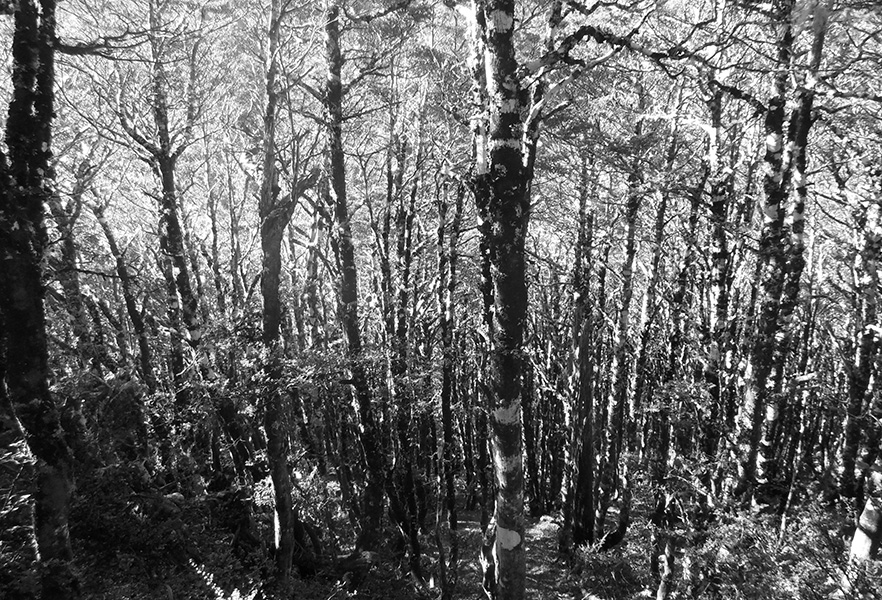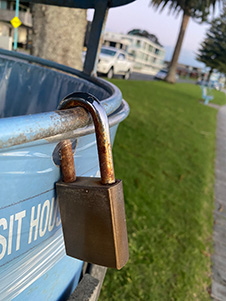
Being hemmed in – a photograph submitted by a participant in the “Through the Eyes of Men” project.
An innovative research project at the University of Otago, Wellington, is using photography to help men open up about their experiences of living with depression, suicidal thoughts and anxiety.
In the project, 'Through the Eyes of Men', led by Senior Research Fellow Dr Sarah McKenzie, 21 men get behind the lens, taking photos which reflect their personal experiences of living with mental distress, and what helped or hindered their mental health journeys.
Their images are displayed in a digital exhibition on the project's website, along with descriptions of what they mean to the photographers. Their photos range from scenes of nature to urban, family and home life.

Dr Sarah McKenzie.
Dr McKenzie says the pictures opened up channels for the men to describe the reality of living with mental distress and explain what recovery feels like to them.
“This collection of photographs and descriptions shows us first-hand the realities of men's mental health, through their eyes.”
The men who took part in the project were a diverse group, ranging in age from 23 to 62 years.
“We were able to capture multiple perspectives among men in terms of age, social and ethnic backgrounds,” Dr McKenzie says. “We spoke to Māori, Pākehā and migrant men across the country. Some were fathers, others were sole parents, some were heterosexual, others were gay, and some were unemployed, while others had stressful jobs.”
She says our knowledge and understanding of men's experiences of mental distress is limited here in New Zealand.
“This is surprising given suicide is a leading cause of death among men and particularly Māori men. We know anxiety and depression are known risks for suicide, but there are many other social and cultural factors at play.”
For many of those involved, the images which most resonate with their mental distress are grey or black, reflecting their sense of being trapped, feeling isolated, or of being in a dark tunnel.

Locked in.
For one man, a photo of a padlock reflects his sense of being locked in: “When I saw the padlock it was this feeling of, particularly with anxiety, that feeling of being locked into it. No matter how hard you try to get rid of your anxiety you just can't”.
Another photographed a dense forest, reflecting his sense of feeling hemmed in: “When I was really in the thick of it, I pushed everybody away. I'd cross the street to avoid friends that I'd known for a long time. So the sense of being crowded in society … there's just this sense of being hemmed in”.
For some, use of drugs and alcohol were factors hindering their recovery, while others mentioned their struggles with grief, a loss of faith, or in finding an identity.
When it came to what helped their recoveries, the men focused on scenes which reflected time spent with children, support from partners, time spent in the outdoors, as well as reading or creative or practical activities.
For one man, a sunset scene reflected the moment he began taking the time to enjoy 'little moments': “This is when I was starting to learn how to take moments, take breaths, take time to be with me, time to enjoy the little beauties in your day.”
Another found expressing his creativity through art was therapeutic: “I can go to the studio and get into my art process, and that invigorates me. It gets me out of my head and puts me into something. So it's a process that will make me feel better.”
The men involved in the project talked of how helpful it had been to articulate their thoughts and feelings, with one saying it had been a “very cathartic” process.
Another appreciated having a different means to express their thoughts and emotions, saying: “That's why I was drawn to the project of actually doing photos. Because it's another way of expressing something. And it's amazing, you know, that classic line, 'a photo says a thousand words'. It really is true.”
Dr McKenzie wants the project to help destigmatise mental distress and encourage conversations about men's mental health.
“We need to better understand why men are more likely than women to take their own lives, and what we can do to support men in talking about their mental health difficulties.”
'Through the eyes of men' was funded through a Marsden Fast-Start grant administered by the Royal Society Te Apārangi.
For more information, contact:
Dr Sarah McKenzie
Senior Research Fellow
Department of Psychological Medicine
University of Otago, Wellington
Email sarah.mckenzie@otago.ac.nz
Cheryl Norrie
Communications Adviser
University of Otago, Wellington
Mob +64 21 249 6787
Email cheryl.norrie@otago.ac.nz
Where to get help
Suicide crisis helpline
0508 828 865 (0800 TAUTOKO)
Lifeline Aotearoa 24/7 support
0800 545 354 or TEXT 4357
Samaritans 24/7 helpline
0800 726 666
Anxiety helpline
0800 269 4389 (0800 ANXIETY)